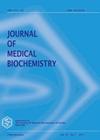DIFFERENT DOSES OF RECOMBINANT FSH AND DETERMINING PARAMETERS OF OXIDATIVE STRESS
IF 1.5
4区 医学
Q4 BIOCHEMISTRY & MOLECULAR BIOLOGY
引用次数: 0
Abstract
Background: This study aimed to examine if there is a connection between recombinant FSH dose and OS parameters in serum and the impact on IVF outcome. Methods: This study consisted of 101 participants that went through IVF procedures. Parameter that were tested are SOD, SH groups and MDA. Serum samples were drawn before stimulation and on the last day of ovarian stimulation. Results: Two groups were formed according to the dose of gonadotropins (rFSH). In both groups there were no significant differences in live–birth rate and miscarriage. In both groups mean serum MDA and SH-groups were significantly higher after ovarian stimulation, but mean serum SOD was significantly lower when compared to values before stimulation. There were less patients without OS before stimulation. Conclusion: Our results suggest that there is a difference in serum concentration in groups SOD, SH groups and MDA at the beginning and at the end ovarian stimulation. On the other hand, dose of rFSH is not related with change of parameters for oxidative stress, quality of oocytes, embryos, fertilization, pregnancies, and miscarriage rate. Patients without oxidative stress before the IVF procedure needed lower doses of gonadotropins during stimulation. Keywords: in vitro fertilization, oxidative stress, gonadotropin dose不同剂量重组卵泡刺激素对氧化应激参数的影响
背景:本研究旨在探讨血清中重组卵泡刺激素(FSH)剂量和OS参数与体外受精(IVF)结果的影响之间是否存在联系。& # x0D;方法:本研究包括101名接受体外受精手术的参与者。检测SOD、SH组和MDA。在刺激前和卵巢刺激最后一天抽取血清样本。& # x0D;结果:按促性腺激素(rFSH)剂量分为两组。两组的活产率和流产率无显著差异。两组患者卵巢刺激后血清MDA和sh均显著高于刺激前,血清SOD均显著低于刺激前。刺激前无OS的患者较少。
结论:卵巢刺激开始和结束时,血清SOD、SH和MDA浓度存在差异。另一方面,rFSH剂量与氧化应激、卵母细胞质量、胚胎、受精、妊娠和流产率等参数的变化无关。体外受精手术前无氧化应激的患者在刺激期间需要较低剂量的促性腺激素。
关键词:体外受精;氧化应激;促性腺激素;
本文章由计算机程序翻译,如有差异,请以英文原文为准。
求助全文
约1分钟内获得全文
求助全文
来源期刊

Journal of Medical Biochemistry
BIOCHEMISTRY & MOLECULAR BIOLOGY-
CiteScore
3.00
自引率
12.00%
发文量
60
审稿时长
>12 weeks
期刊介绍:
The JOURNAL OF MEDICAL BIOCHEMISTRY (J MED BIOCHEM) is the official journal of the Society of Medical Biochemists of Serbia with international peer-review. Papers are independently reviewed by at least two reviewers selected by the Editors as Blind Peer Reviews. The Journal of Medical Biochemistry is published quarterly.
The Journal publishes original scientific and specialized articles on all aspects of
clinical and medical biochemistry,
molecular medicine,
clinical hematology and coagulation,
clinical immunology and autoimmunity,
clinical microbiology,
virology,
clinical genomics and molecular biology,
genetic epidemiology,
drug measurement,
evaluation of diagnostic markers,
new reagents and laboratory equipment,
reference materials and methods,
reference values,
laboratory organization,
automation,
quality control,
clinical metrology,
all related scientific disciplines where chemistry, biochemistry, molecular biology and immunochemistry deal with the study of normal and pathologic processes in human beings.
 求助内容:
求助内容: 应助结果提醒方式:
应助结果提醒方式:


